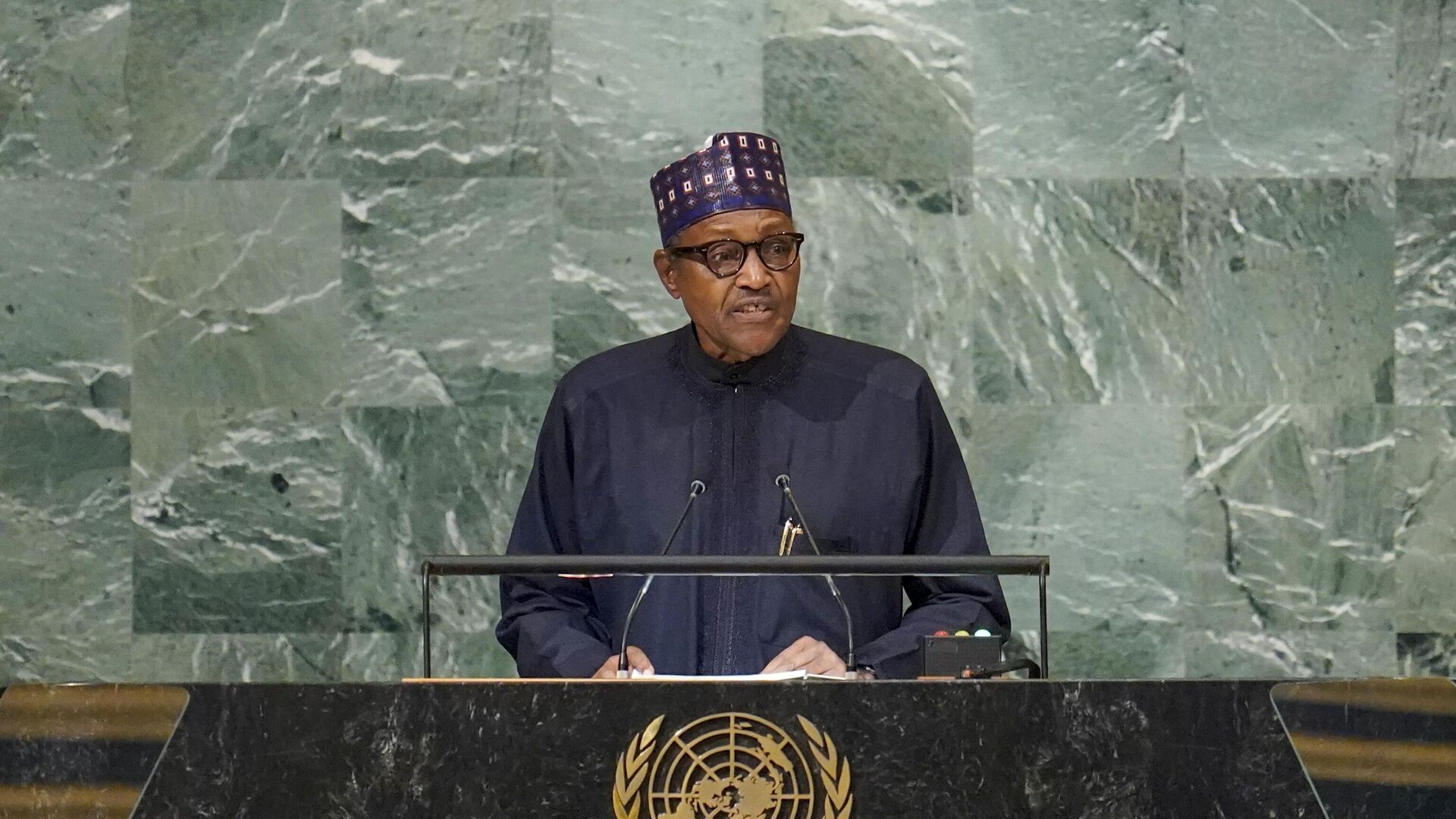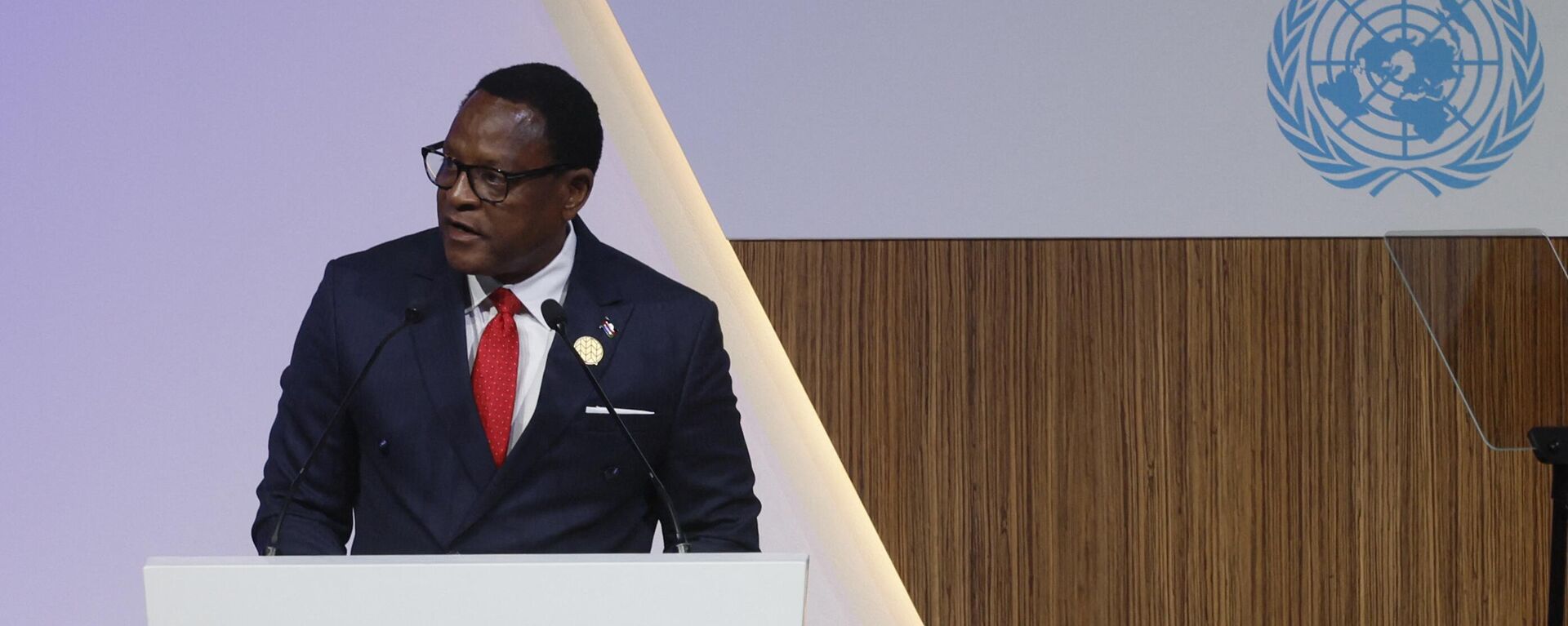https://sputnikglobe.com/20230307/nigerias-buhari-slams-unfair-international-debt-architecture-1108140161.html
Nigeria's Buhari Slams 'Unfair' International Debt Architecture
Nigeria's Buhari Slams 'Unfair' International Debt Architecture
Sputnik International
Nigerian President Muhammadu Buhari has criticized the existing international financial organizations and their debt architecture for working in favor of more advanced countries.
2023-03-07T12:12+0000
2023-03-07T12:12+0000
2023-03-07T12:28+0000
africa
muhammadu buhari
doha
the united nations (un)
financial system
debt
developing countries
developed countries
https://cdn1.img.sputnikglobe.com/img/07e7/03/07/1108140610_0:0:3072:1728_1920x0_80_0_0_19b13b0ba500068f1d44f74641971ab3.jpg
Nigerian President Muhammadu Buhari has castigated today's international financial organizations and their "unfair" debt architecture as favoring only advanced nations.He aligned with the United Nations Secretary-General’s description on the global financial system as an "unfair debt architecture that not only charges poor countries much more money to borrow on the market than advanced economies, but downgrades them when they even think of restructuring their debt or applying for debt relief."Speaking at the UN Conference of Least Developed Countries held in Doha, Qatar, Buhari called on developed and developing nations to offer duty-free and quota-free market access to the 46 countries mentioned on the UN least-developed countries (LDC) list; most of these countries are African ones.In line with the UN rules concerning the LDCs, the countries listed should be granted such benefits as preferential market access, technical assistance, aid, and capacity-building on technology.Buhari went on to shine the spotlight on the mounting debt burden shouldered by least-developed countries and emphasized the need to reform the international financial architecture so that poor countries become its priority.Given these conditions, the Nigerian leader continued, the possibility for many countries to achieve the Sustainable Development Goals "remains bleak."The head of state also said the development of poor countries is often impeded by challenges which are outside their hands and beyond their control, and this corroborates the need of countries for assistance in unlocking their economic potential.Buhari made these statements as Nigeria struggles its foreign debt burden.According to Finance Minister of Nigeria Zainab Ahmed, the western African country spent nearly 80% of its revenue on servicing its debt between January and November 2022, which amounted to $11.3 billion.Besides Nigeria, there is a host of African countries grappling with the same problem.According to a 2022 report by the World Bank, more than half of low-income countries of which most are African, cannot meet their obligations on paying foreign debts.One of the listed countries is Ghana, in Africa’s west, whose foreign debt amounts to 58% of its total $37.4 billion public debt as of October 2022. That said, the country has been trying to achieve its external debt restructuring under the G20 Common Framework.Along with Ghana, Zambia, in Africa’s south, is also pursuing debt restructuring, because the country is unable to pay its $13.04 billion external debt in a timely manner.Earlier, Zambian President Hakainde Hichilema lashed out at what he called "suicidal" interest rates comparing them to a "black mamba kiss of death".Concerning the foreign debt trap problem, many African leaders have repeatedly urged African nations not to deal with international financial organizations due to "unfair" conditions.For instance, touching upon the external loans of African nations in June 2022, Ghana's President Nana Akufo-Addo urged Africa to stop "begging" the West, emphasizing the key role of the African Development Bank and the Africa Export-Import Bank (Afreximbank) concerning the continent's development.
https://sputnikglobe.com/20230306/african-leaders-call-for-concrete-action-to-end-wests-era-of-unkept-promises-at-un-summit-1108084218.html
africa
doha
Sputnik International
feedback@sputniknews.com
+74956456601
MIA „Rossiya Segodnya“
2023
News
en_EN
Sputnik International
feedback@sputniknews.com
+74956456601
MIA „Rossiya Segodnya“
Sputnik International
feedback@sputniknews.com
+74956456601
MIA „Rossiya Segodnya“
international financial organizations, africa foreign debt, external debt, least developed countries
international financial organizations, africa foreign debt, external debt, least developed countries
Nigeria's Buhari Slams 'Unfair' International Debt Architecture
12:12 GMT 07.03.2023 (Updated: 12:28 GMT 07.03.2023) Struggling with their external debt burden is one of the burning issues for many African countries. Many believe that the problem is that certain countries cannot timely service their foreign debt due to the unfair terms stipulated by international financial organizations, which forces them to seek restructuring in the first place.
Nigerian President Muhammadu Buhari has castigated today's international financial organizations and their "unfair" debt architecture as favoring only advanced nations.
He aligned with the United Nations Secretary-General’s description on the global financial system as an "unfair debt architecture that not only charges poor countries much more money to borrow on the market than advanced economies, but downgrades them when they even think of restructuring their debt or applying for debt relief."
Speaking at the UN Conference of Least Developed Countries held in Doha, Qatar, Buhari called on developed and developing nations to offer duty-free and quota-free market access to the 46 countries mentioned on the UN least-developed countries (LDC) list; most of these countries are African ones.
In line with the UN rules concerning the LDCs, the countries listed should be granted such benefits as preferential market access, technical assistance, aid, and capacity-building on technology.
Buhari went on to shine the spotlight on the mounting debt burden shouldered by least-developed countries and emphasized the need to reform the international financial architecture so that poor countries become its priority.
He described the existing rules set forth by international financial institutions as "unfair debt architecture that not only charges poor countries much more money to borrow on the market than advanced economies, but downgrades them when they even think of restructuring their debt or applying for debt relief."
Given these conditions, the Nigerian leader continued, the possibility for many countries to achieve the Sustainable Development Goals "remains bleak."
The head of state also said the development of poor countries is often impeded by challenges which are outside their hands and beyond their control, and this corroborates the need of countries for assistance in unlocking their economic potential.
Buhari made these statements as Nigeria struggles its foreign debt burden.
According to Finance Minister of Nigeria Zainab Ahmed, the western African country
spent nearly 80% of its revenue on servicing its debt between January and November 2022, which amounted to $11.3 billion.
Besides Nigeria, there is a host of African countries grappling with the same problem.
According to a 2022 report by the World Bank, more than half of low-income countries of which most are African, cannot meet their obligations on paying foreign debts.
One of the listed countries is Ghana, in Africa’s west, whose foreign debt amounts to 58% of its total $37.4 billion public debt as of October 2022. That said, the country has been trying to achieve its external debt restructuring under the G20 Common Framework.
Along with Ghana, Zambia, in Africa’s south, is also pursuing debt restructuring, because the country is unable to pay its $13.04 billion external debt in a timely manner.
Earlier, Zambian President Hakainde Hichilema
lashed out at what he called "suicidal" interest rates comparing them to a "black mamba kiss of death".
"... the reckless interest rates that our colleagues agreed — 10, 11, 12%. Suicidal. That’s a black mamba kiss of death," Hichilema said.
Concerning the foreign debt trap problem, many African leaders
have repeatedly urged African nations not to deal with international financial organizations due to "unfair" conditions.
For instance, touching upon the external loans of African nations in June 2022, Ghana's President Nana Akufo-Addo urged Africa to stop "begging" the West, emphasizing the key role of the African Development Bank and the Africa Export-Import Bank (Afreximbank) concerning the continent's development.
"If we stop being beggars and spend African money inside the continent, Africa will not need to ask for respect from anyone, we will get the respect we deserve. If we make it prosperous as it should be, respect will follow," he noted.



